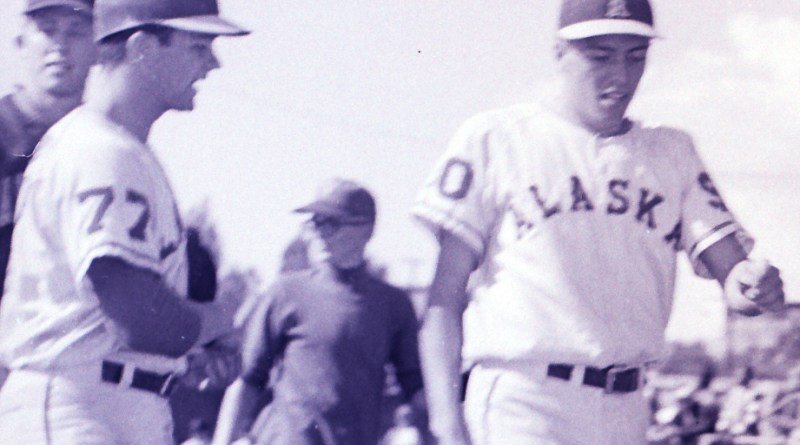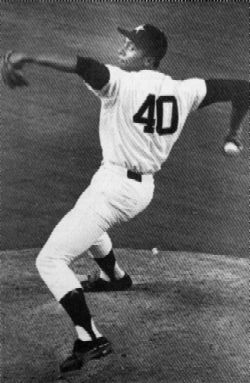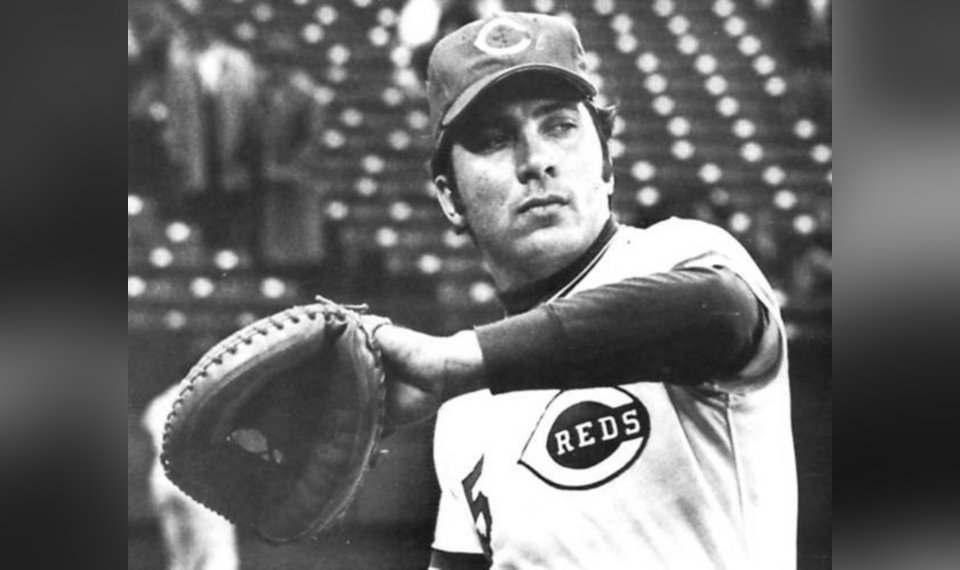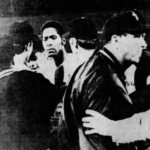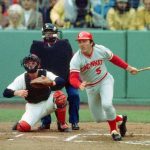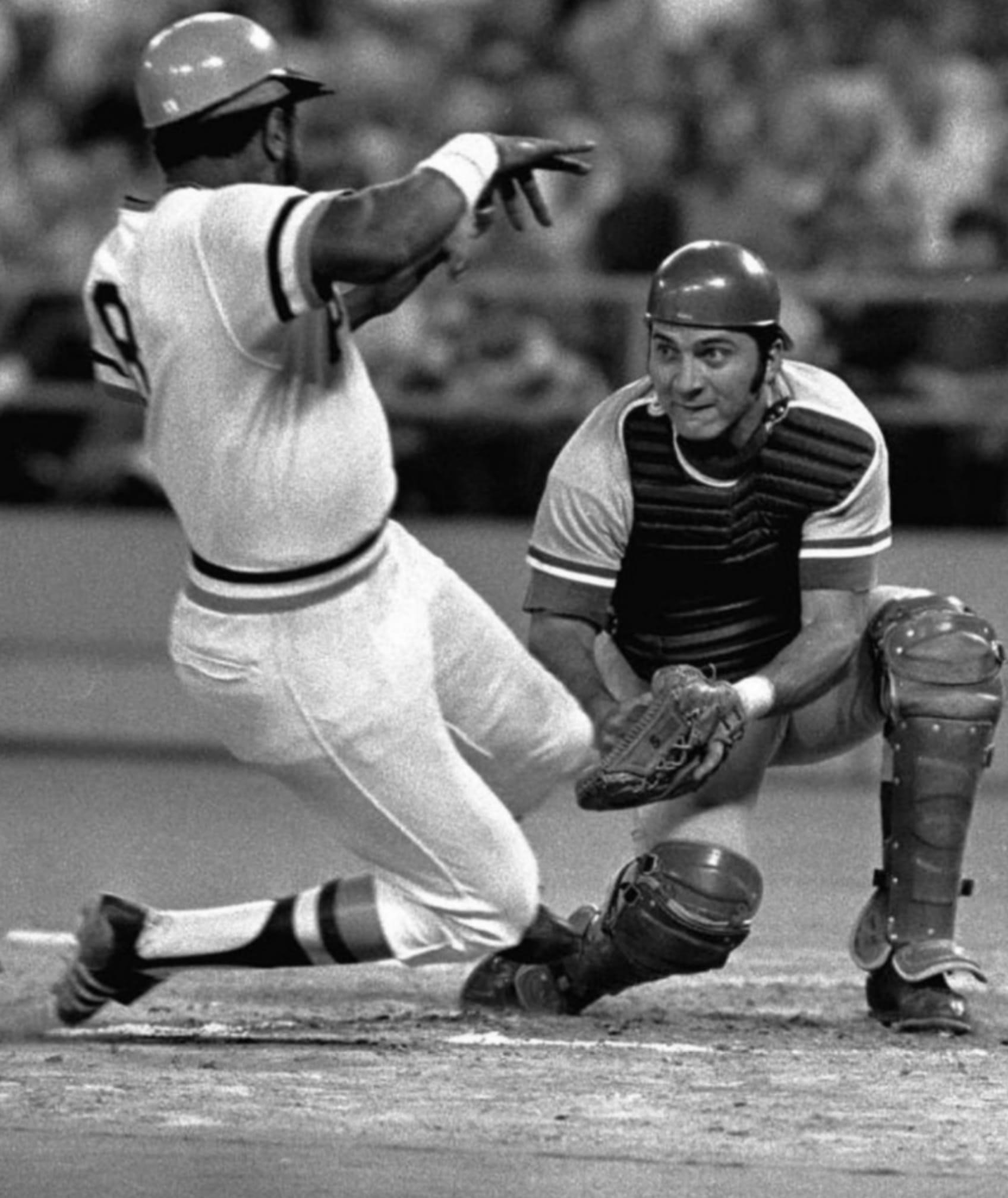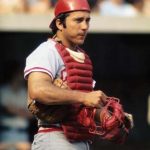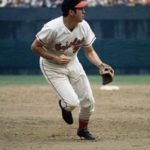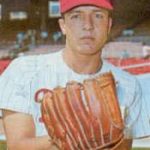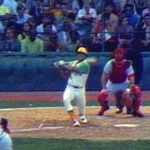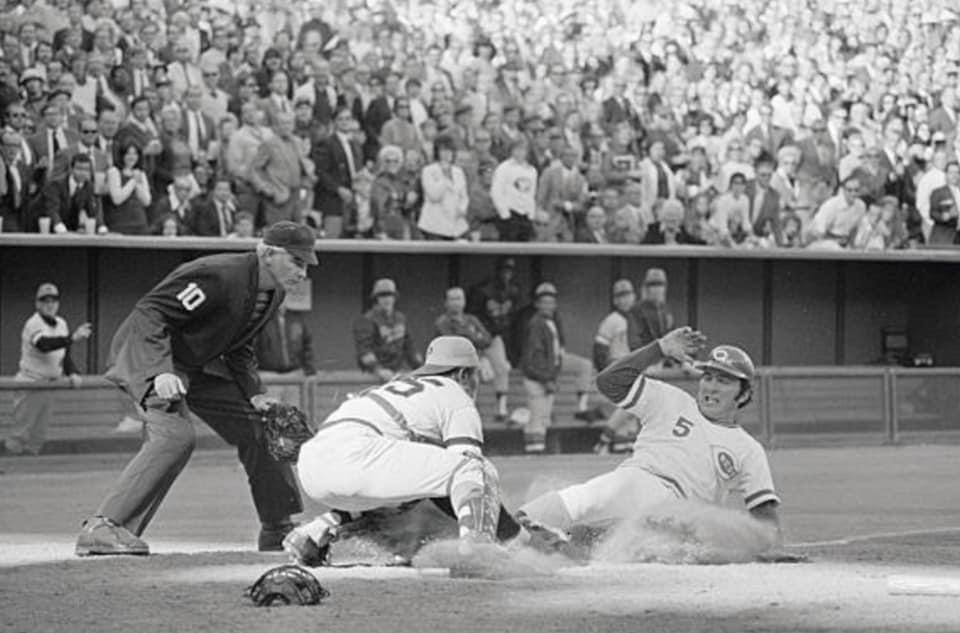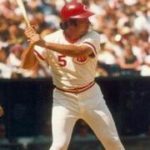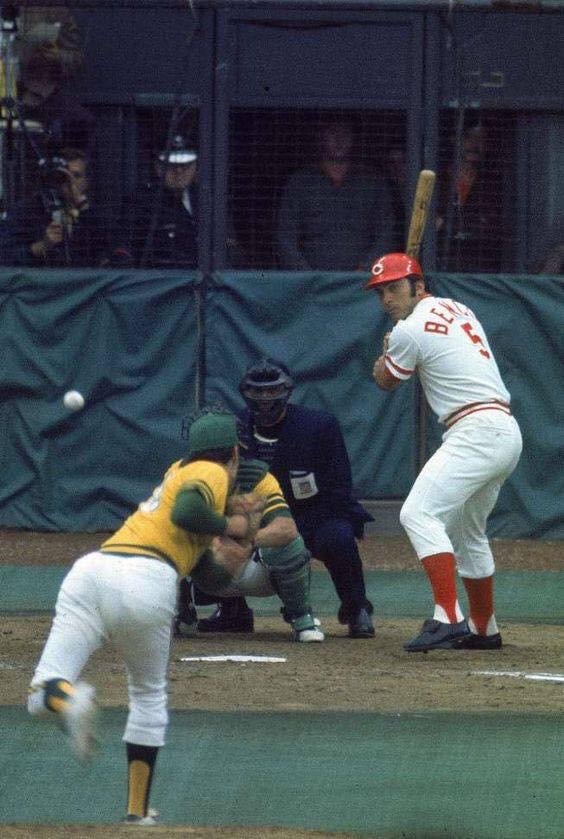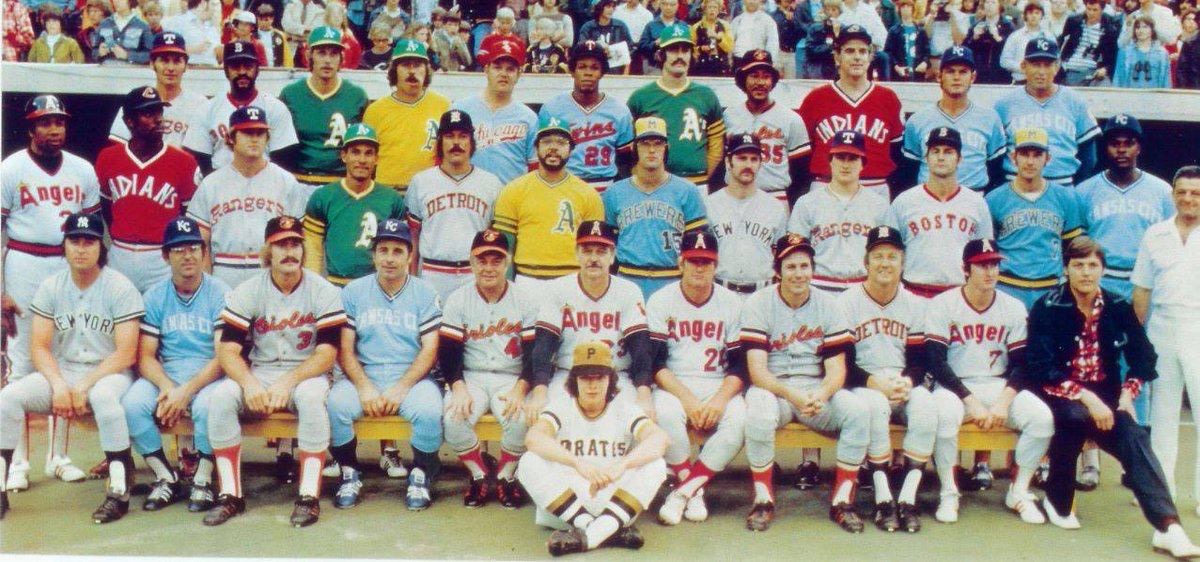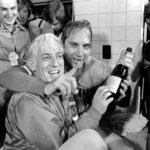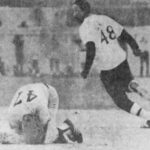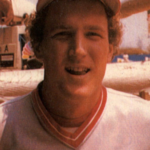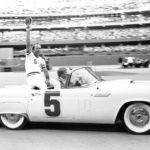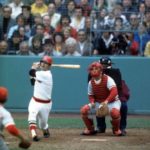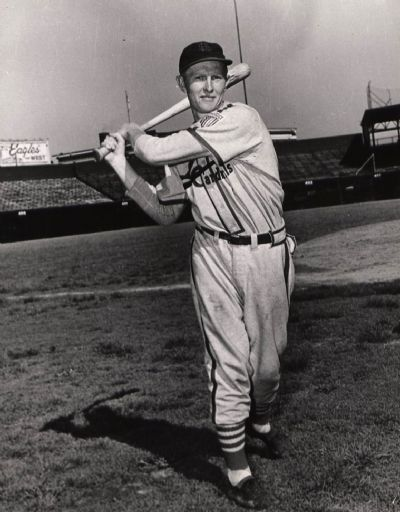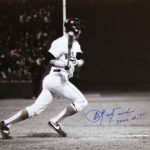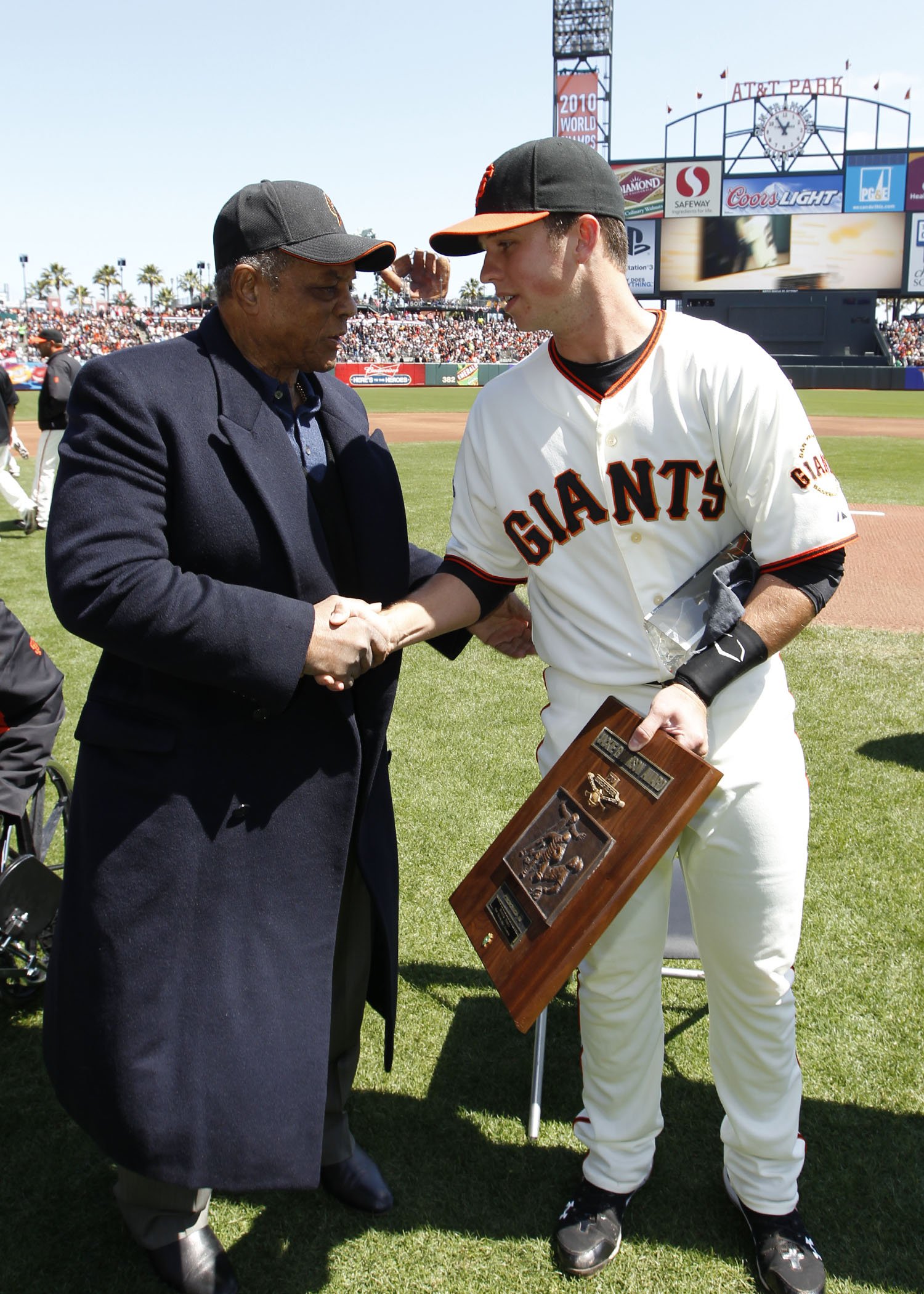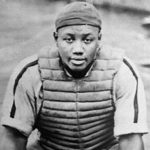Johnny Bench Stats & Facts
Johnny Bench
Positions: Catcher, Third Baseman and First Baseman
Bats: Right • Throws: Right
6-1, 197lb (185cm, 89kg)
Born: December 7, 1947, in Oklahoma City, OK
Draft: Drafted by the Cincinnati Reds in the 2nd round of the 1965 MLB June Amateur Draft from Binger HS (Binger, OK).
High School: Binger HS (Binger, OK)
Debut: August 28, 1967 (12,626th in major league history)
vs. PHI 3 AB, 0 H, 0 HR, 0 RBI, 0 SB
Last Game: September 29, 1983
vs. SFG 1 AB, 1 H, 0 HR, 2 RBI, 0 SB
Hall of Fame: Inducted as Player in 1989. (Voted by BBWAA on 431/447 ballots)
View Johnny Bench’s Page at the Baseball Hall of Fame (plaque, photos, videos).
Rookie Status: Exceeded rookie limits during 1968 season
Full Name: Johnny Lee Bench
Nicknames: Little General
Twitter: @JohnnyBench_5
View Player Info from the B-R Bullpen
View Player Bio from the SABR BioProject
Nine Players Who Debuted in 1967
Reggie Jackson
Graig Nettles
Rod Carew
Johnny Bench
Tom Seaver
Jerry Koosman
Amos Otis
Sparky Lyle
Aurelio Rodriguez
The Johnny Bench Teammate Team
C: Johnny Edwards
1B: Tony Perez
2B: Joe Morgan
3B: Pete Rose
SS: Davey Concepcion
LF: George Foster
CF: Vada Pinson
RF: Ken Griffey Sr.
SP: Tom Seaver
SP: Don Gullett
SP: Gary Nolan
SP: Jack Billingham
SP: Mario Soto
RP: Clay Carroll
RP: Rawley Eastwick
M: Sparky Anderson
Notable Events and Chronology for Johnny Bench Career
Biography
Quite possibly the greatest defensive catcher of all-time, Johnny Bench won two Most Valuable Player awards as a young man and led the best team of the 1970s as a mature major leaguer. He retired having hit more home runs than any other catcher and was one of the best clutch hitters in post-season history. He was the 1968 National League Rookie of the Year and he ended up in the Hall of Fame
Best Season: 1970
Bench won two MVP awards as a relatively young man, in 1970 and 1972. In ’70, at the age of 22, he played in 158 games (playing about 20 games at positions other than catcher) and battered opposing pitchers. He batted .293 with league leading totals in homers (45) and RBI (148). He set a career high with 177 hits and tallied 97 runs. Though he was young, he was the best catcher in baseball, as evidenced by his rocket arm. He earned a Gold Glove, as well as the NL MVP award. The Reds ran away with the NL West division and advanced to the World Series, in which Brooks Robinson made a habit of stealing hits from Bench.
Full Bio
Johnny Lee Bench was born in Oklahoma City, Oklahoma, on the 6th anniversary of Pearl Harbor, in 1947, and grew up in Binger, Oklahoma. His dream was to become a major league baseball player and his father encouraged him to play catcher. The youngest of three brothers, Johnny played baseball as soon as he could walk. Bench’s father Ted was a good athlete who played baseball in the service, and like his future Hall of Fame son, he was a catcher.
In the mid-1950s, Ted Bench organized a Pee-Wee Baseball team in Binger. The youngest Bench was made catcher of that team. His father soon realized he was a natural. Growing up in the tornado ravaged region of Oklahoma, in a small town, Bench found little to do but play baseball. Though his class had just 21 students, it did have a baseball and basketball team, and Johnny starred on both. As an American Legion player, Bench hurled a no-hitter at the age of 16, playing against boys older than him.
Bench admired fellow Oklahoman Mickey Mantle, and he wanted to follow his hero into the big leagues. In his senior year, tragedy struck the small town of Binger when a bus carrying the baseball team went off the road and flipped several times. Bench was not hurt seriously, but two of his teammates were killed.
As Bench finished his senior year, major league scouts began checking him out, in anticipation of the amatuer draft. The Baltimore Orioles and Cincinnati Reds showed the most interest, and it was through perserverance that Cincinnati was able to see his value. Like many star high school players, Bench was both a great hitter and pitcher. In his final high schol game his coach had him on the mound. Though he was a talented player with a strong arm, Bench did not display promise as a pitcher. Several scouts left the game early and missed Bench in the late inings when he was inserted at the catcher position. The Reds scout stayed and realized what a gem Bench was. The Cincinnati Reds made Johnny Bench their second selection in the June, 1965 draft. Future teammate Bernie Carbo was selected ahead of him. After two seasons in the minors, Bench arrived in the big leagues in 1968. When Ted Williams met Bench during his rookie campaign he signed a baseball: “To Johnny Bench, a Hall of Famer for sure.” Teddy Ballgame was right.
At the age of 22 in 1970, Bench led the National League with 45 homers and 148 RBI to win his first MVP award while leading the Cincinnati Reds to the pennant. Two years later he repeated the feat, hitting 40 long balls and plating 125 runners. In 1974, he won his third RBI crown, completing his every-other-year cycle. He was named to 14 All-Star teams and won ten straight Gold Gloves.
Bench’s playoff and World Series heroics were legendary in Cincinnati. He played in four Fall Classics, winning twice. In the 1970s, the Reds reached the post-season six times and finished second three of the other four seasons. In the 1976 World Series, Bench went 8-for-15 (.533) with four extra-base hits (including two homers) and six RBI in a four-game sweep of the New York Yankees. On three occasions Bench hit game-tying or game-winning home runs for the Reds in the post-season.
In 1980, Bench set a ML record by catching 100 or more games in his 13th consecutive season. Elected to the National Baseball Hall of Fame in January 1989, Bench was selected as the greatest catcher in baseball history by The Sporting News in 1998.
In 2000, Bench was selected the catcher on baseball’s All-Century Team. When the Pete Rose gambling controversy made headlines in the late 1980s, Bench was one of Rose’s former teammates who did not support the all-time hits leader. Bench remained convinced that Rose had bet on baseball and that his former teammate deserved his punishment. @ET-DC@eyJkeW5hbWljIjp0cnVlLCJjb250ZW50IjoicG9zdF90YWdzIiwic2V0dGluZ3MiOnsiYmVmb3JlIjoiTGVhcm4gTW9yZSBhYm91dCB0aGUgdGVhbXMsIHBsYXllcnMsIGJhbGwgcGFya3MgYW5kIGV2ZW50cyB0aGF0IGhhcHBlbmVkIG9uIHRoaXMgZGF0ZSBpbiBoaXN0b3J5IC0gLSAtIC0gLSAtIC0gIiwiYWZ0ZXIiOiIiLCJsaW5rX3RvX3Rlcm1fcGFnZSI6Im9uIiwic2VwYXJhdG9yIjoiIHwgIiwiY2F0ZWdvcnlfdHlwZSI6InBvc3RfdGFnIn19@
Factoids, Quotes, Milestones and Odd Facts
Played For
Cincinnati Reds (1967-1983)
Similar: Later in their careers, Gary Carter and Bench shared many similarities. Carter was sort of the poor-man’s Johnny Bench.
Linked: Brooks Robinson robbed Bench of a few hits in the 1970 World Series, solidifying his reputation as the greatest defensive third baseman in history… Tony Perez and Bench were a tough duo in the middle of the Big Red Machine’s lineup in the 1970s… Pete Rose and Bench had a strained relationship as teammates and after their playing days… Rollie Fingers threw a famous sneaky strike three pitch to Bench in the 1972 World Series, after having tossed a couple wide pitches intentionally.
Best Season, 1970
Bench won two MVP awards as a relatively young man, in 1970 and 1972. In ’70, at the age of 22, he played in 158 games (playing about 20 games at positions other than catcher) and battered opposing pitchers. He batted .293 with league leading totals in homers (45) and RBI (148). He set a career high with 177 hits and tallied 97 runs. Though he was young, he was the best catcher in baseball, as evidenced by his rocket arm. He earned a Gold Glove, as well as the NL MVP award. The Reds ran away with the NL West division and advanced to the World Series, in which Brooks Robinson made a habit of stealing hits from Bench.
Awards and Honors
1968 NL Gold Glove
1968 NL Rookie of the Year
1969 NL Gold Glove
1970 NL Gold Glove
1970 NL MVP
1971 NL Gold Glove
1972 NL Gold Glove
1972 NL MVP
1973 NL Gold Glove
1974 NL Gold Glove
1975 NL Gold Glove
1976 NL Gold Glove
1976 ML WS MVP
1977 NL Gold Glove
Post-Season Appearances
1970 National League Championship Series
1970 World Series
1972 National League Championship Series
1972 World Series
1973 National League Championship Series
1975 National League Championship Series
1975 World Series
1976 National League Championship Series
1976 World Series
1979 National League Championship Series
Where He Played: Catcher (1,742 games), 3B (195), 1B (145), OF (111).
Big League Debut: August 28, 1967
From an excerpt from his autobiography, Catch You Later, published in 1979: “I couldn’t get up to Cincinnati fast enough. It was late August 1967, and I found my way over to Crosley Field. I was there to replace Johnny Edwards. Just as in Tampa when I came from high school, the Reds put me in immediately. Dave Bristol had taken over from Don Heffner and he wanted me in there. I was proud, excited, and nervous, but again, once I started playing, that all went away. We were playing the Phillies in my first game, and I remember how upset I was when I missed one of Dick Ellsworth’s fastballs that I thought I should have parked. I later doubled off Chris Short, and with a sacrifice fly got my first RBI.
Post-Season Notes
Reggie Jackson may have earned the nickname “Mr. October,” but Cincinnati Reds catcher Johnny bench could easily lay claim to the title instead. His timely blasts helped the Reds in four separate post-seasons.
In the 1972 playoffs, the Reds and the Pittsburgh Pirates battled to a deciding fifth game. Playing in Cincinnati and trailing 3-2 in the bottom of the ninth, Bench homered to tie the score and the Reds went on to win the game and the pennant.
In 1973, the Reds squared off against the New York Mets in the NL Playoffs. In the opening game, Tom Seaver took a 1-1 tie into the bottom of the ninth in Cincinnati. Bench blasted a home run off the future Hall of Famer and the Reds won 2-1. The Mets went on to win the series in five games, but Bench had three extra-base hits in the clash.
The 1975 World Series is regarded by many as the greatest ever played. In Game Two, in the bottom of the ninth inning with his team trailing the Red Sox 2-1, Bench doubled off Bill Lee and scored the tying run. The Reds went on to win the game 3-2, and ultimately the series. Even though Bench batted just .207 in the series, three of his six hits were for extra bases, and he drove in four runs.
The 1976 post-season truly belonged to Johnny Bench. In the playoffs against the Philadelphia Phillies he batted .333 in the three-game sweep. In the final game, with the Phils clinging to a 6-5 lead, Bench homered off Ron Reed to tie the score, paving the way to victory. In the World Series, Bench performed as well as any batter in history, collecting eight hits (four for extra-bases) in the four-game sweep of the New York Yankees. He batted .533 and hit two homers with six RBI. In Game Four, he hit a three-run blast in the top of the ninth to clinch the game and the series.
In all, Bench played in ten post-season series — four World Series and six NL playoff series. He hit at least one homer in every series but one. In 45 post-season games he drove in 20 runs.
Notes
Bench and the National League were 12-2 in the All-Star game, failing to win only in 1971 and 1983.
Hitting Streaks
18 games (1979)
Transactions
Selected by Cincinnati Reds in the 2nd round of the free-agent draft (June 8, 1965).
Most Runs Batted In (1967-1983)
1. Tony Perez… 1488
2. Reggie Jackson… 1435
3. Carl Yastrzemski… 1383
4. Johnny Bench… 1376
5. Al Oliver… 1247
All-Star Selections
1968 NL
1969 NL
1970 NL
1971 NL
1972 NL
1973 NL
1974 NL
1975 NL
1976 NL
1977 NL
1978 NL
1979 NL
1980 NL
1983 NL
Replaced
Johnny Edwards, who had been the Reds’ primary catcher from 1962-1967.
Replaced By
Joe Nolan as catcher, in 1981. But young Alex Trevino was the heir apparent, taking over in 1982, but never fulfilling his promise.
Best Strength as a Player
Defense, though his power is hard to ignore. He was an amazing player. Imagine Mike Piazza and Charles Johnson combined.
Largest Weakness as a Player
Speed, though that’s a bit unfiar to a catcher.




